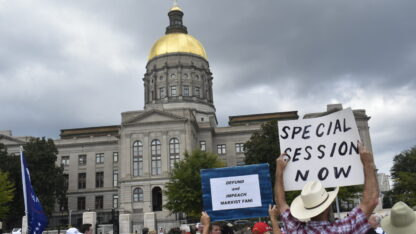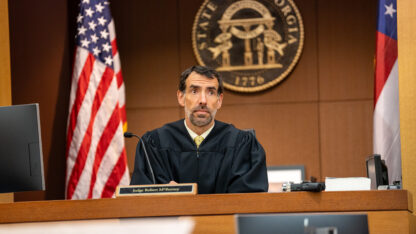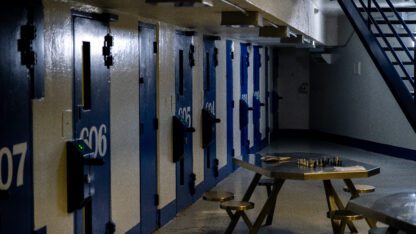A judge on Friday denied Mark Meadows’ request to move his Georgia election subversion case to federal court, ruling that the Trump White House chief of staff must fight the charges in state court instead.
U.S. District Judge Steve Jones in Atlanta issued the ruling after a hearing last week. He asked for additional information from both sides before reaching his decision.
The ruling is a big early win for Fulton County District Attorney Fani Willis, who spent 2 1/2 years investigating and building the case against former President Donald Trump, Meadows and 17 others before obtaining the sweeping indictment under Georgia’s anti-racketeering law. She has said she wants to try all the defendants together.
A spokesperson for Willis and a lawyer for Meadows did not immediately respond to requests for comment Friday evening.
Several other people charged in the indictment have also filed motions seeking to move their cases to federal court and have hearings before Jones later this month. Friday’s ruling in Meadows’ case could spell trouble for the others.
Jones said his order addressed a “relatively narrow question” of whether Meadows had demonstrated whether his case should be moved to federal court under the federal officer removal statute, and he determined that he had not.
The defendants were indicted last month by a Fulton County grand jury on charges they participated in a sprawling scheme to illegally try to overturn Trump’s 2020 presidential election loss in Georgia even though the state’s voters had selected Joe Biden.
All have pleaded not guilty.
Meadows said his actions were taken as part of his role as chief of staff to the Republican president. He and his lawyers also argued that, since he was a federal official at the time, the charges against him should be heard in federal court and, ultimately, dismissed for lack of merit.
Prosecutors said the actions laid out in the indictment were meant to keep Trump in office after he lost to Biden, a Democrat. They said the acts were explicitly political in nature and are illegal under the Hatch Act, which restricts partisan political activity by federal employees. As such, they said, the case should stay in Fulton County Superior Court.
The practical effects of Meadows’ case moving to federal court would have been a jury pool that includes a broader area than just overwhelmingly Democratic Fulton County and a trial that would not be photographed or televised, as cameras are not allowed inside federal courtrooms. But it would not open the door for Trump, if he’s reelected in 2024, or another president to pardon Meadows because any conviction would still happen under state law.









